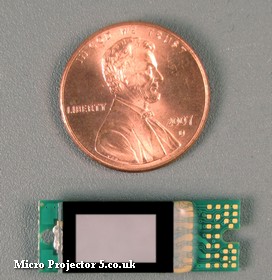I read a fair bit of technology news and discussion online, its a kind of hobby of mine – around this I make sweeping statements about what I think things will end up like. While a fairly pointless thing to do its interesting to note what you think things will be like in the future at one point, even if in 2015 I find this post (how will I find it?) and laugh at its outlandish predictions about technology and society. So here goes, my thoughts on what technology will be like for humans in 2015.
The reason this post really sparked was this post on pico projectors and what pico projectors might be like in 2015. I think pico projector’s (tiny projectors that will fit in your hand but produce a projection pretty much the quality of your old tv, anywhere @ 50 inchs) will get huge. I don’t doubt for one minute that MVIS stock will be the first sign of this in the coming months (the microvision showWX is going to be the worlds first mainstream big selling pico – prediction) and this will be only the start for developing display technology. Over the next 5 years visually representative technology will blossom. We will see embedded pico-projector’s slot into city planning, home design, products such as laptops (netbooks), mobile phones, games systems, camera’s. Within lcd little growth will happen but we will likely see some sort of “ultra hd” – probably double current full hd (1080p), while embedded pico’s will feature a whole host of new resolutions, by 2015 we will definitely see full hd pico’s. This development of display technology will usher in a new age of advertisements, coupled with Augmented Reality and revolution amongst the Operating Systems.

Which brings me nicely to Augmented Reality. AR. Currently there is much buzz around Augmented reality, which I believe really is the sudden sci-fi geek realisation that technically the technology to fully provide AR is out, its been out for more than a year. Smart phones with knowledge of where they are and decent digital cameras have been around longer than the iPhone. It seems once this dawned on people everyone made a mad rush to make something AR, regardless of what it is. As a result magazines, advertisers and marketing companies largely came first (presumably they had the quickest fluid funds to pay for AR.) This marrs the technology a bit if you ask me but perhaps as AR becomes more meaning based this will change. My jury is out on AR but I think it won’t be as big a deal as everyone is making out it will be.
Business will change, or rather some business’s will change the way they use technology. You always get early adopters but I believe a good proportion of companies that operate around creative, co-operative ideology will gear up more technologically as the younger generation come into professionalism. We will see different technological assistance of work in the workplace. Board meetings will not only be worldwide (like now via Cisco tele-conferencing) but they will be assisted by interactive technology, touch and display will play large parts in this technology, beyond the Microsoft surface table and towards the science fiction of minority report. Data will be housed, represented and communicated differently. A few years ago usb sticks and solid state drives didn’t offer an easy solution to copying files, network speeds were a 100th of what they largely are today, there was no cloud. As data management and storage develop as too will the way we use it. We will probably have identifiers rather than storage in 2015. e.g. rather than copying a file to a usb stick you will simply instruct your interface to relate that data to a physical object, a soundwave (a word/phrase perhaps?) or a time of day or place, provided you can prove who you are you could then recieve it. You could carry a 200gb file with you in your wallet or on your fingernail, as the likelihood is that 200gb file will be stored centrally in what people now call the “cloud” (but will probably be a server in london or a main city) and you will simply use a relation to prompt whatever interface into providing you with this file.

There will be hurdles in achieving universal centralised data but by 2015 there will be a huge proportion less of personal computing power stored in the home. The google OS is perhaps a sign of a branching of operating systems, but I don’t see google dominating the operating system market. Microsoft have become a lot stronger over the last 18 months but the real truth of it is that neither of these developers seem to be truely embracing all of the technology developments happening. Perhaps this lag in uptake is natural, Microsoft does show some promising signs but is held back by business concerns, google seems to throw itself into the ideas without checking they are in the right direction, linux, well linux is linux. By 2015 I predict there will be at least another major world provider of what we currently refer to as operating systems. The whole concept needs re-exploring from the ground up, even starting again beyond the google os. Touch for example, AR and improved options for display are all completely ignored by all of the aforementioned operating systems, Microsoft is the only developer that even references these things but is yet to truly develop a commercial option.
Search will change too. The last few years has seen a huge uptake worldwide in searching for things which in turn has pushed marketing, sales and online business into a whole new age. It’s also cemented new business models such as affiliate marketing, search based advertising and more grey area web production. The long tail has well and truly become a reality, many successful business people spend their days driving traffic from long tail search into successful sales. This will continue but it wont settle in a single routine for long. Affiliate marketing will take to interactive media more as this becomes more integral in everyday life, search will some how adapt to a new more astute audience that is used to getting good search results fast and who quickly picks up trends and becomes integral members of up and coming online phenomena such as reddit, twitter etc. Beyond real-time, search will need to integrate much more with outside sources, new operating systems and the work out the best way to catalogue and express the ever expanding online data and how it is created and used.

HTML 5 is on its way too, this will be a major improvement but it wont be the last the web sees pre 2015. By 2015 I believe that the “internet” as we know it, a vast linked store of webpages will be a very different beast. Microsoft (XBOX), Apple (iPhone), Sony (Ps3) – these are all well known, global brands and they are all investing / operating in the new world of applications. Pioneered by Apple and the iphone the idea of segmented approved tools that are properly ordered was a (very apple) genius idea. Bringing a (standard) apple simplicity to what was previously a confusing and avoided world of software for a lot of people. Microsoft, Sky, Sony and other huge technology developers did not miss this success. In the coming years slowly these companies will target specific software/hardware at every possible market audience. By 2015 every member of your family will be buying something digital. Expanding on the segmented digitally providable media of the iphone app, television programs, games, music, films and books will all be available at the click of a button, tap of a screen or utterance of a command (and payment systems such as xbox subscriptions and ps3 accounts will remove the actual money part of the transaction further accelerating digital sales.) This new availability of media will be supported by webpages, but the web-pages are much more likely to be totally interactive, 3d integration is already in browsers but we will see more of this as well as individualised experiences. Imagine every web-page you accessed could (based on rules of privacy) know your name, interests etc – the web could be a much more interactive environment. By 2015 though I think the web could be on its way to new pastures, gone with the current ideal of “pages” accessed by address. An OS with search integrally built in could remove the requirement for a browser, content could be constructed on the fly and applications/services/movies/experiences could replace pages as we know them, with the situation that web pages changing from a square, box of a screen to a multi surface vivid world that we live in, there is no doubt in my mind that the OS and the web “page” as we know it will adapt to a new medium.
We are living in a time which is the true beginning of technology adoption, 2015 might bring a few or all of my predictions into reality, it could just as likely bring thousands more. Social adoption will drive these things forward and in return the technology will hopefully create a more co-operative, fair and equal world society.





2 Comments
Marvelous futurism! The uninhibited speculation is the pattern of a kindred spirit. You leave off with the adaptive web, and the end of static page rectangles. It just so happens my proto-startup is working on a rudimentary social strea
listening application. Why shouldn’t we help the process along (and profit) from the shift in behavior :)?
I’d share the link but my fingers are going numb on this mobile.
I’ll respond to your comment on my blog with it at home.
Hi Mark,
Thanks for your kind comments – Its interesting is it not to dream progressively? I am a new subscriber of yours and I intend to watch your proto-startup with great interest.
Do let me know if I can help at all, I have quite a varied online skillset 😉
Comments Archive
Hi there. This is my old blog and it's archived, so you can no longer post new comments on this post (2015 – What will technology be in 2015?).
Read my new blog about writing software and stories at WoodyHayday.com